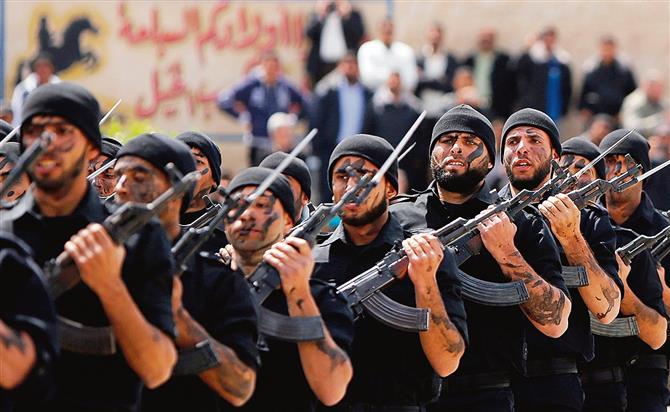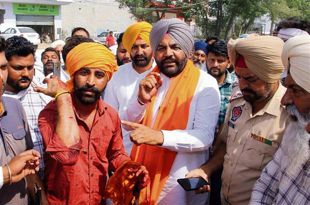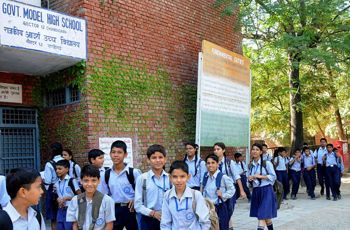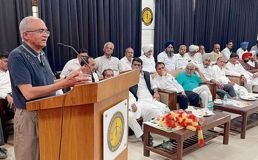
Devastating: A massive terror attack by Hamas on Israeli territory has triggered a fierce war. Reuters
G Parthasarathy
Chancellor, Jammu Central University & former High Commissioner to Pakistan
The prolonged occupation of Arab lands by Israel inevitably led to the formation of Palestinian militant group Hamas in late 1987 during the Palestinian uprising, popularly described as the Intifada. Hamas, which many Western countries regard as being a radical Islamist organisation, strengthened the resistance to the Israeli occupation of Palestinian territories. Palestinian resistance in Israeli-occupied territories grew with the ultimate objective of establishing an Islamic state in the Gaza Strip and the West Bank of the Jordan River. The extensive support that groups like Hamas and Hezbollah enjoy from the public for their resistance to Israeli occupation of Arab lands, including in Syria and Lebanon, cannot be ignored even in the Arab world. This, despite the fact that Egypt had made its peace in its neighbourhood by establishing diplomatic ties with Israel. But even Egypt cannot ignore the sentiments in fellow Arab nations.
Arab distrust and animosity towards Israel will grow, as demonstrated by the Al-Ahli hospital tragedy in Gaza.
Then Prime Minister Narasimha Rao moved decisively in establishing diplomatic relations with Israel in 1992. While India has remained steadfast in its support for the Palestinian cause, its relations with Israel have grown remarkably. There were and remain strong feelings in India that Israel has to be guaranteed security across clearly defined frontiers in its neighbourhood. New Delhi also firmly believes that the resort to violence by Israel or others can only escalate hostilities. The reality is that Israel does continue to face periodic attacks from across its borders by Palestinian groups. At the same time, however, one has to bear in mind that the Palestinians cannot be denied their inalienable human, territorial, economic and political rights.
Leading this movement against Israeli policies and occupation has been Hamas, founded by a Palestinian imam and Islamist activist, Ahmed Yassin. Hamas was and remains a hardline organisation backing an armed struggle against Israel. Not surprisingly, an alternative secular rival to the Hamas, named Fatah, soon emerged, quite evidently with Egyptian and Western support. But Hamas remains the Palestinian star, enjoying wide public support for an armed struggle to achieve territorial claims, while reaching out for public support in elections to the Palestine Legislative Council. Hamas also took control of the Gaza Strip from its Fatah rivals and won the 2006 Legislative Council elections. Hamas has remained a thorn in Israel’s flesh and resorted to growingly radical religious policies and practices. Its cadres have fought the Israelis relentlessly. In short, what the Hamas evidently seeks is an Islamist state within the borders Egypt held in 1967 before its defeat at the hands of Israel.
A massive terror attack by Hamas on Israeli territory has now sparked a fierce war. The Israeli ground offensive is imminent. In the meantime, the US is reinforcing its naval strength, which is being deployed to symbolically buttress the Israeli forces. With American legislative elections scheduled to be held next month, followed by the presidential poll next year, the Biden administration has little choice but to go along with Israel’s course of action. The US, in turn, is assured of the backing from its European allies. Russia and China will look on gleefully if the US gets involved in yet another military action, which will not be appreciated across the Islamic world.
India seems well placed to meet the challenges arising from the growing tensions in West Asia. Prime Minister Narendra Modi expressed India’s sympathy and support to Israel’s Prime Minister Netanyahu after the Hamas attack. PM Modi observed: “Deeply shocked by news of the terrorist attacks.” He added: “Our thoughts and prayers are with the innocent victims and their families. We stand in solidarity with Israel at this difficult hour.” The External Affairs Ministry has, thereafter, clarified this statement, while noting: “India has always advocated resumption of direct negotiations towards establishing a sovereign, independent state of Palestine, living within secure and recognised borders, side by side with Israel.” In short, New Delhi is carefully watching the emerging situation in West Asia.
While India’s relations with the Arab world and Israel have remained cordial and constructive, we need to bear in mind our highest priorities in our western neighbourhood. Particular emphasis needs to be laid on our relations with the Gulf countries, notably Saudi Arabia and the UAE, with whom we enjoy close ties. The recent visit of Saudi Arabia’s Crown Prince Mohammed bin Salman to New Delhi for the G20 summit and his ceremonial bilateral visit thereafter are set to further strengthen these vital relations. More importantly, both the UAE and Saudi Arabia are set to become long-term partners of India as efforts progress for building the India-Middle East-Europe Economic Corridor. Moreover, there are 3.5 million Indians living in the UAE; they remitted back an estimated $16 billion in 2022. About 2.6 million Indians living in Saudi Arabia remitted back an estimated $5 billion last year.
As a result of PM Netanyahu’s less-than-sensitive handling of relations with Arab neighbours and the Palestinians, we are going to see a closer relationship between Iran and militant Arab groups. The US will continue to be seen, more than ever, as being responsible for the woes of the Arab masses, thanks to its less-than-realistic assessment of developments in the region. The little chance that remained for a solution to the woes of the Palestinian people will become more remote. Netanyahu will face the blame for this situation. Arab distrust and animosity towards Israel will grow, as demonstrated by the Al-Ahli hospital tragedy. The prospects of peace and harmony beyond our western shores appear dim and grim.
Join Whatsapp Channel of The Tribune for latest updates.




























